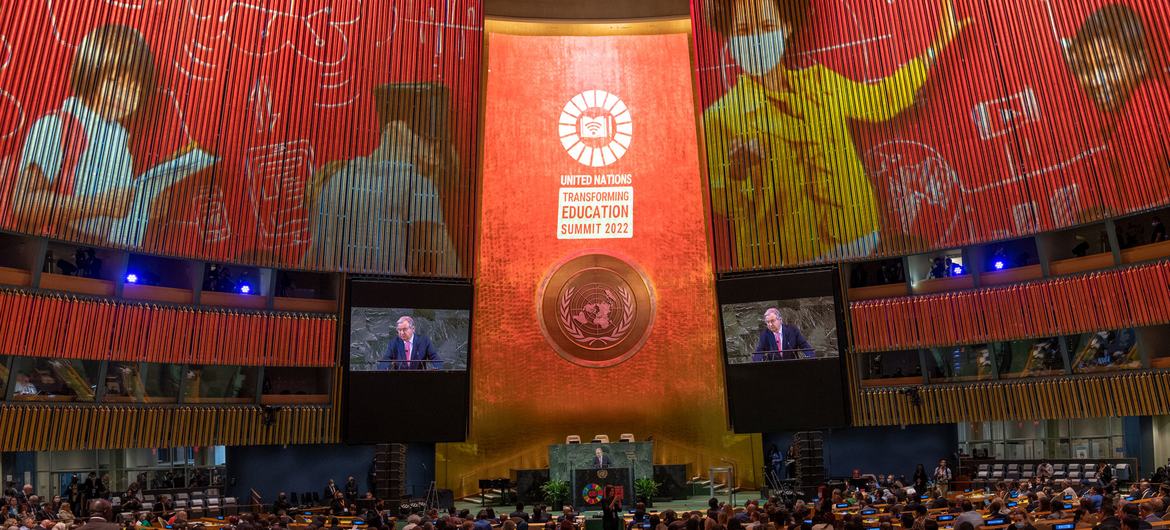
Education transformation needed for ‘inclusive, just and peaceful world’ – UN chief
N Photo/Cia Pak | Before speaking at the UN Transforming Global Education Summit, Secretary-General António Guterres addresses the SDG Moment in the General Assembly Hall.
United Nations, 19 September 2022
Education has been Secretary-General António Guterres’ “guide and touchstone,” he said on Monday, the final day of the Transforming Education Summit, warning that it is in “a deep crisis”.
“I regard myself as a lifelong student…Without education, where would I be? Where would any of us be?”, he asked those gathered in the iconic Generally Assembly Hall.
Because education transforms lives, economies and societies, “we must transform education”.
Downward spiral
Instead of being the great enabler, the UN chief pointed out that education is fast becoming “a great divider”, noting that some 70 per cent of 10-year-olds in poor countries are unable to read and are “barely learning”.
With access to the best resources, schools and universities, the rich get the best jobs, while the poor – especially girls – displaced people, and students with disabilities, face huge obstacles to getting the qualifications that could change their lives, he continued.
Meanwhile, COVID-19 has “dealt a hammer blow to progress on SDG4”, the Sustainable Development Goal targeting equitable quality education.
“But the education crisis began long before – and runs much deeper”, Mr Guterres added, citing the International Commission on the Future of Education report card, which clearly stated: “Education systems don’t make the grade”.
Failing grade
Dependent upon outdated and narrow curricula, under-trained and underpaid teachers, and rote learning, he maintained that “education is failing students and societies”. At the same time, the digital divide penalizes poor students as the education financing gap “yawns wider than ever”. “Now is the time to transform education systems”, underscored the UN chief.
21st century vision
With a new 21st century education vision taking shape, he flagged that quality learning must support the development of the individual learner throughout their life.
“It must help people learn how to learn, with a focus on problem-solving and collaboration…provide the foundations for learning, from reading, writing and mathematics to scientific, digital, social and emotional skills…develop students’ capacity to adapt to the rapidly changing world of work…[and] be accessible to all from the earliest stages and throughout their lives”.
At a time of rampant misinformation, climate denial and attacks on human rights, Mr. Guterres stressed the need for education systems that “distinguish fact from conspiracy, instill respect for science, and celebrate humanity in all its diversity”.
From vision to reality

© UNICEF/Giacomo Pirozzi | Children sit in a circle with their teacher at the Early Child Development centre in Garin Badjini village, south east Nigeria.
To make the vision a reality, he highlighted five commitment areas beginning with protecting the right to quality education for everyone, everywhere – especially girls and those in crisis hotspots.
Emphasizing that schools must be open to all, without discrimination, he appealed to the Taliban in Afghanistan: “Lift all restrictions on girls’ access to secondary education immediately”.
As “the lifeblood of education systems,” Mr. Guterres next called for a new focus on the roles and skillsets of teachers to facilitate and promote learning rather than merely transmitting answers.
Third, he advocated for schools to become “safe, healthy spaces, with no place for violence, stigma or intimidation”.
To achieve the fourth target, that the digital revolution benefits all learners, he encouraged governments to work with private sector partners to boost digital learning content.
Financial solidarity
“None of this will be possible without a surge in education financing and global solidarity”, said the UN chief, introducing his final priority.
He urged countries to protect education budgets and funnel education spending into learning resources.
“Education financing must be the number one priority for Governments. It is the single most important investment any country can make in its people and its future,” spelled out the Secretary-General. “Spending and policy advice should be aligned with delivering quality education for all”.
‘Global movement’
In closing, he stated that the Transforming Education Summit will only achieve its global goals by mobilizing “a global movement”.
“Let’s move forward together, so that everyone can learn, thrive and dream throughout their lives. Let’s make sure today’s learners and future generations can access the education they need, to create a more sustainable, inclusive, just and peaceful world for all”.
The original article appeared here.